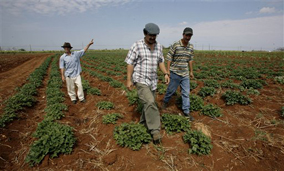Cuba's 'seed man' wins global environmental prize
- Submitted by: admin
- Business and Economy
- Personalities
- 04 / 19 / 2010

Humberto Rios Labrada's campaign to let Cuban farmers choose the crops and seed varieties best for their lands helped him win one of the 2010 Goldman Environmental Prizes — known as the "green Nobels" — on Monday.
"I want the seed to adapt to the people, not the people to adapt to the seed," the 47-year-old, self-described hippy told The Associated Press during a recent visit to this farming town 20 miles east of Havana.
Rios' wants to make Cuban farms more sustainable by giving farmers more autonomy — a radical notion in what has long been a strictly top-down planned economy where officials tell producers just what to grow, even if it isn't quite right for the soil.
Government officials at first bristled at his ideas, but his success, along with greater government openness to local autonomy, has led them to grant him unusual and growing leeway in working with 50,000 farmers and counting.
Amid spindly stalks of young corn and dark-green sweet potato shoots on a Bauta farm, he lectured farmers on how to mix seed combinations to improve yields and quality — techniques that have helped produce bigger beans, tastier squash, heartier rice and better varieties of other crops across Cuba.
"The idea is to give farmers more of an active role," said Rios, "more participation in the process so we can increase production, but more importantly increase the happiness of the people in the fields."
One of the ways he makes them happy is song, treating those he works with to rhyming verses. In Bauta, he offered a few racy lyrics about a juicy mango — Cuban slang that could also be interpreted as a bedroom romp.
Goldman recipients are chosen annually from six regions worldwide. Winners receive $150,000 at a ceremony in San Francisco on Monday night, and Rios obtained sometimes tough-to-come-by permission to attend the event from both the Cuban and U.S. governments.
The prize has been awarded to 139 people from 79 countries since philanthropist Richard Goldman and his late wife Rhoda created it in 1990. Rios is the first Cuban to win.
Prize director Lorrae Rominger said Rios' selection emphasizes the importance of sustainable agriculture, and he was especially deserving given the governmental constraints of Cuba.
"It was clear that he was a leader within his community," she said. "He started out very small and now his work has grown incredibly."
Rios was a government bio-diversity researcher when, in 1999, he began organizing seed fairs, giving farmers themselves access to different varieties of crops and bypassing the government distribution centers and scientists who had traditionally
told farmers what to grow and kept seed banks under lock and key.
He also organized sessions where members of Cuban agricultural cooperatives could share their know-how.
For decades, Moscow provided the island with subsidies and heavy machinery that led to a state-run farming sector dependent on chemicals. When the Soviet Union disbanded and its financial support dried up, so did the chemicals.
"We thought all of us were going to die," Rios said
His seed fairs and seminars have increased yields — the reason officials, desperate to increase food output, encourage him, even if quantifying the improvement is difficult since many produce on small scales.
And, despite such efforts, most of the island's agricultural sector is still dominated by communist central planers.
Like seed banks in other countries, Cuba's government has stockpiled tens of thousands of different kinds of seeds, including more than 500 varieties of rice alone.
But getting the farmers more seeds was only half the battle. Rios also had to convince them to change the way they worked. So he not only sang in the fields, but also produced a CD full of catchy guitar and patriotic lyrics promoting the virtues of
organic farming.
While some songs have decidedly adult themes, many are playful, sprinkling lyrics about rice and beans into romatic odes.
"With music, everybody gets more relaxed and the real work begins," Rios said.
Conny Almekinders, a crop sociologist at Wageningen University in the Netherlands, has been working with Rios for nearly 15 years. She recalled flying to Cuba to meet him for the first time in 1997:
"There's this hairy, sloppy guy, and I thought 'Oh, who have I come here to see?,'" she said. "But that's who he is. It makes him so creative."
Today, Rios keeps his dark hair cut shorter and visits about 300 farms a year.
Among those he's helping is 36-year-old Mario Garcia, a private farmer who recently received 10 hectares of formerly state-run land in Bauta under a new program launched in hopes small-scale farmers can help Cuba reduce reliance on imported
food.
Garcia and his 72-year-old father are experimenting, planting corn, sweet potatoes, beans, yuca, squash and taro root on land once used for tobacco. They sell what they produce to the state and eat anything left over.
"I like to see for myself what works and what doesn't," Garcia said, pouring into his hands dark seeds from black-bean variety No. 37. "It's the only way to really know."
By WILL WEISSERT (AP)
Source: www.google.com
Comments